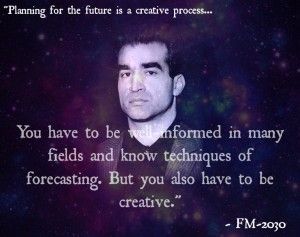Dec 11, 2014
FM2030: Are You A Transhuman?
Posted by Johnny Boston in categories: lifeboat, science, transhumanism
This archive file was compiled from audio of a discussion futurist FM 2030 held at the University of California, February 6th, 1994. In this discussion 2030 laid out an overview of his ‘transhuman’ philosophy and held a back and forth with other people present in the discussion. Discussion and debate included items such as the value of researching ‘indefinite lifespan’ technologies directly as opposed to (or in addition to) more traditional approaches, such as researching cures for specific diseases.
The excerpts in this archive file present a sort of thesis of FM 2030’s transhuman ideas.
About FM 2030: FM 2030 was at various points in his life, an Iranian Olympic basketball player, a diplomat, a university teacher, and a corporate consultant. He developed his views on transhumanism in the 1960s and evolved them over the next thirty-something years. He was placed in cryonic suspension July 8th, 2000. For more information about FM 2030, view the GPA Archive File: ‘Introduction to FM 2030′ or visit some of the following links:



 Quoted: “Bitcoin technology offers a fundamentally different approach to vote collection with its decentralized and automated secure protocol. It solves the problems of both paper ballot and electronic voting machines, enabling a cost effective, efficient, open system that is easily audited by both individual voters and the entire community. Bitcoin technology can enable a system where every voter can verify that their vote was counted, see votes for different candidates/issues cast in real time, and be sure that there is no fraud or manipulation by election workers.”
Quoted: “Bitcoin technology offers a fundamentally different approach to vote collection with its decentralized and automated secure protocol. It solves the problems of both paper ballot and electronic voting machines, enabling a cost effective, efficient, open system that is easily audited by both individual voters and the entire community. Bitcoin technology can enable a system where every voter can verify that their vote was counted, see votes for different candidates/issues cast in real time, and be sure that there is no fraud or manipulation by election workers.”









